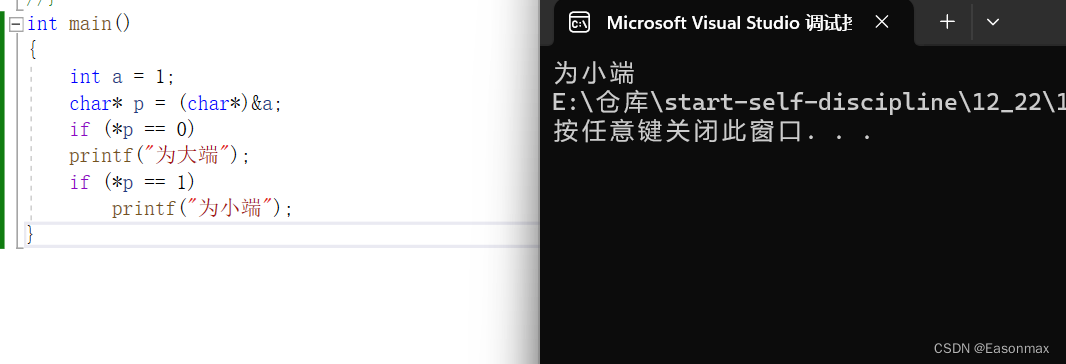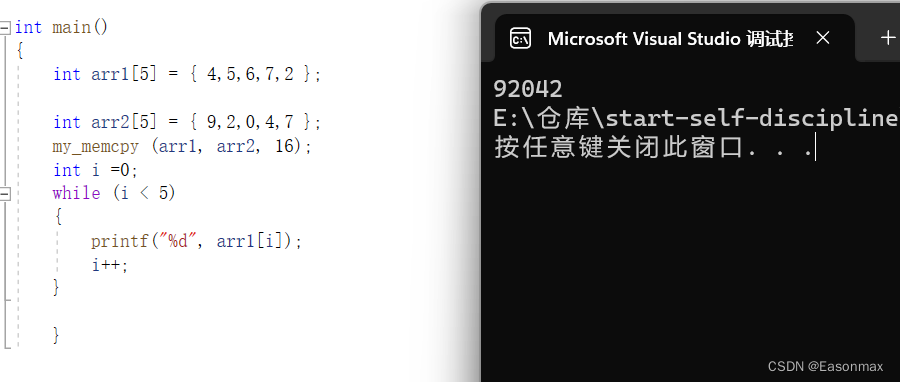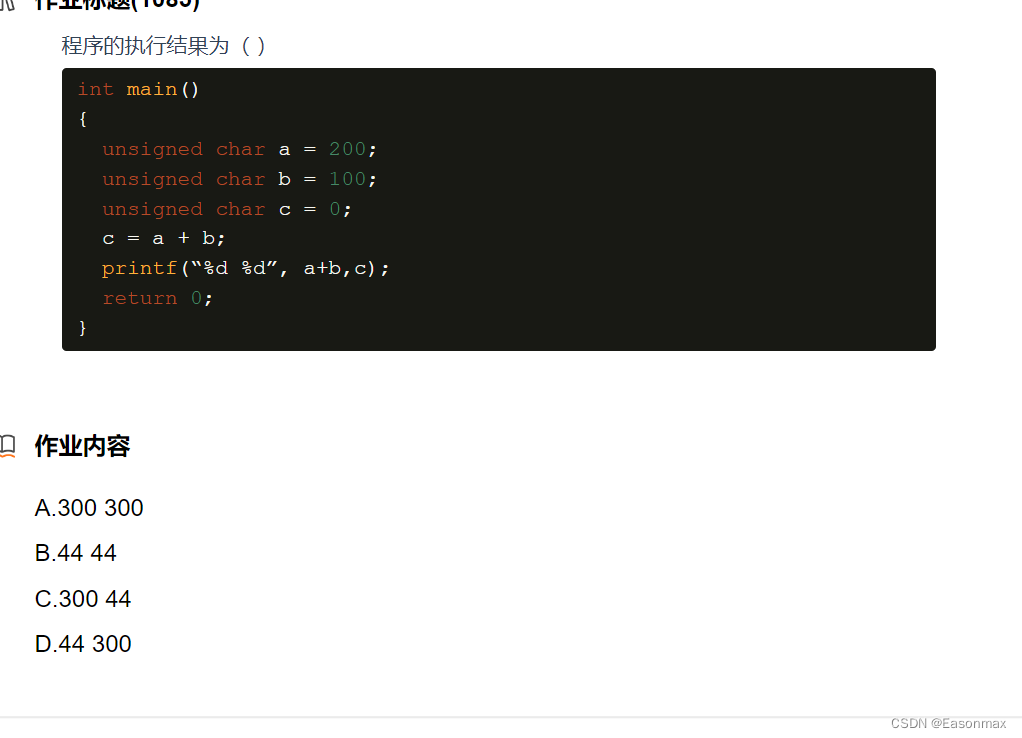字符串函数,内存函数,数据在内存中的存储 练习题
发布时间:2023年12月27日
第一题(判断系统大小端)?
int main()
{
int a = 1;
char* p = (char*)&a;
if (*p == 0)
printf("为大端");
if (*p == 1)
printf("为小端");
}
第二题 (strncpy模拟)
char* my_strncpy(char* str1, const char* str2, size_t num)
{
char* str3 = str1;
size_t a = strlen(str2);
int b = 0;
if (num <=a)
{
while (b <num)
{
*str1++ = *str2++;
b++;
}
}
b = 0;
if (num > a)
{
while (b < a + 1)
{
*str1 = *str2;
if (*str1)
{
str1++;
str2++;
}
b++;
}
int c = 0;
while (c < num - a - 1)
{
str1++;
*str1 = 0;
c++;
}
}
return str3;
}
 ?这里说下strncpy的作用。
?这里说下strncpy的作用。
成功模拟出来了strncpy,其作用一模一样。
第三题(strncat模拟)?
char* my_strncat(char* str1, const char* str2, size_t num)
{
char* str3 = str1;
size_t a = strlen(str2);
int b = 0;
while(*str1)
{
str1++;
}
if (num <=a)
{
while (b <num)
{
*str1++ = *str2++;
b++;
}
str1++;
*str1 = 0;
}
b = 0;
if (num > a)
{
while (b < a + 1)
{
*str1 = *str2;
if (*str1)
{
str1++;
str2++;
}
b++;
}
}
return str3;
}?
?
?成功模拟出来了strncat,其作用一模一样
第四题 (模拟memcpy函数)
void* my_memcpy(void* str1, const void* str2, size_t num)
{
char* a = (char*)str1;
char* b = (char*)str2;
int c = 0;
while (c < num)
{
*a = *b;
if (*a || c != num - 1)
{
a++;
b++;
}
c++;
}
return str1;
}

模拟出一模一样的memcpy函数?
 ?
?
?
第五题(模拟memmove函数)?
void* my_memmove(void* str1, const void* str2,size_t num)
{
char* a = (char*)str1;
char* b = (char*)str2;
if (b >= a)
{
int c = 0;
while (c < num)
{
*a = *b;
if (*a||c!=num-1)
{
a++;
b++;
}
c++;
}
}
if (b < a)
{
num--;
int c = 0;
while (num)
{
*(a + num) = *(b + num);
num--;
}
}
return str1;
}?

 ?
?
?
根据其调试测试出,模拟出的函数memmove打印出的值跟库函数里的memmove一模一样。?所以该memmove模拟成功。
 ?额外想说的
?额外想说的
对于漏掉的strtok函数,strerror函数 函数太过复杂,所以就不模拟了。
而strncmp ,memset,memcmp函数太过简单,就没必要模拟了?
第七题?

?
printf打印char类型是将其转化为4个字节的类型打印的,所以造成有前后不同。?
这题涉及到了整数在内存中的存储以及整数在内存中的具体细节计算。?
?第八题
?
 ?这题涉及到了整数在内存中的存储以及整数在内存中的具体细节计算。跟前面一题一样。
?这题涉及到了整数在内存中的存储以及整数在内存中的具体细节计算。跟前面一题一样。
这题作者本人算错了,答案选c,解析如上。很好的一题,建议画内存格子图?
?
?
文章来源:https://blog.csdn.net/Easonmax/article/details/135208170
本文来自互联网用户投稿,该文观点仅代表作者本人,不代表本站立场。本站仅提供信息存储空间服务,不拥有所有权,不承担相关法律责任。 如若内容造成侵权/违法违规/事实不符,请联系我的编程经验分享网邮箱:chenni525@qq.com进行投诉反馈,一经查实,立即删除!
本文来自互联网用户投稿,该文观点仅代表作者本人,不代表本站立场。本站仅提供信息存储空间服务,不拥有所有权,不承担相关法律责任。 如若内容造成侵权/违法违规/事实不符,请联系我的编程经验分享网邮箱:chenni525@qq.com进行投诉反馈,一经查实,立即删除!
最新文章
- Python教程
- 深入理解 MySQL 中的 HAVING 关键字和聚合函数
- Qt之QChar编码(1)
- MyBatis入门基础篇
- 用Python脚本实现FFmpeg批量转换
- Underactuated Robotics - 欠驱动机器人学(一)
- 在1G的内存中,对百亿个QQ号去重?
- [Linux]HTTP状态响应码列举
- 小狐狸ChatGPT系统 H5前端底部菜单导航文字修改方法
- GO 的那些 IDE
- Python-利用resource限制资源使用
- Grafana(三)Grafana 免密登录-隐藏导航栏-主题变换
- 嵌入式开发——SPI原理
- 【数据库】简单聊聊数据库可以做什么,有什么用?
- 软件测试学到这个程度,面试轻松拿下20K